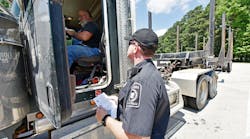A coalition of small-business groups continues to press Congress about the use of questionable data in the new plan to determine if a trucking company is too unsafe to operate.
In a Feb. 3 letter to Sen. Deb Fischer of the Committee on Commerce, Science and Transportation, the coalition restates objections it made last month just ahead of the publication of proposed revision to the Safety Fitness Determination (SFD) rule. Along with developing legislation to reform the way the Dept. of Transportation regulates the trucking industry, Fischer also recently chaired the confirmation hearing for Scott Darling, nominated by President Obama to lead the Federal Motor Carrier Safety Administration (FMCSA).
The groups argue that the SFD proposal violates provisions in the new highway bill, or FAST Act, passed late last year. Specifically, FMCSA’s Notice of Proposed Rulemaking (NPRM) skips a procedural step and the agency also “makes no effort to hide the fact that its SFD NPRM fundamentally relies on CSA/SMS”—roadside inspection data and analysis that Fischer and Congress ordered to be reviewed.
“The NPRM confirmed our expectations that FMCSA’s ‘new’ program is based squarely on and intertwined with CSA and SMS. Motor carriers would be targeted—and in some cases directly rated—with SMS methodology using the same Behavior Analysis and Safety Improvement Categories (BASICs),” the letter says. “The violation severity weights FMCSA proposes to use are the same as those in the current SMS methodology.”
The coalition—which includes the National Association of Small Trucking Companies, the Western State Trucking Association, the Alliance for Safe, Efficient and Competitive Truck Transportation, and others—also takes issue with Darling’s responses to Fischer’s questioning during the confirmation hearing.
“You had asked Mr. Darling whether the NPRM was ‘going to include CSA-related data’ and whether the flawed data was ‘going to be used in any way in this new rulemaking,’ but his responses focused on the argument that SFDs would not be based on SMS alerts or relative percentiles,” the letter recalls. “We understand and appreciate that you were asking Mr. Darling a broader, more important question. SMS data and methodology are thoroughly integrated into the agency’s NPRM, which is clearly not what you and other transportation leaders in Congress intended.”
FMCSA Spokesman Duane DeBruyne declined to comment on the letter.
Under the proposal, roadside inspection data does indeed play a more significant role in determining if a carrier is to be officially deemed “unfit” to operate. Essentially, a truck operator can be shut down if roadside inspection results fall below specific minimum standards. The ratings under the proposal would be updated monthly. Currently, a safety fitness determination cannot be issued without an on-site investigation by government representatives.
FMCSA has emphasized that the proposal “incorporates rigorous data sufficiency standards” and would require that a significant pattern of non-compliance be documented in order for a carrier to fail a BASIC.
And the agency continues to press ahead. In keeping with federal regulatory policy, FMCSA has notified the National Governors Assn. that the proposal “may impact some State laws, regulations or regulatory activity.”
“As part of this rulemaking, FMCSA proposes to adopt a requirement that States receiving MCSAP grants be required to enforce orders issued by FMCSA related to CMV safety and hazardous materials transportation safety, which would include, among others, orders placing an unfit motor carrier
out of service after FMCSA has determined the motor carrier is unfit," the agency writes.
The letter, signed by Associate Administrator for Policy Larry Minor, encourages State officials to contact the agency directly for more details.
The SFD proposal is open for public comment though March 21 on the federal rulemaking site, regulations.gov.




